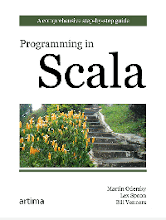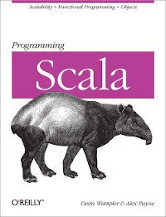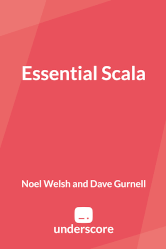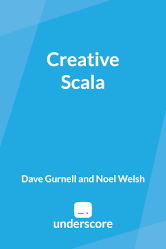Last Updated on May 22, 2022
Scala is a modern, object-functional, multi-paradigm, Java-based programming and scripting language that’s released under the Apache License 2.0. It blends functional and object-oriented programming models. Scala introduces several innovative language constructs. It improves on Java’s support for object-oriented programming by traits, which are stackable and cannot have constructor parameters. It also offers closures, a feature that dynamic languages like Python and Ruby have adopted.
Scala is particularly useful for building cloud-based/deliverable Software as a Service (SaaS) online applications, and is also proficient to develop traditional, imperative code.
The language helps programmers write tighter code. It uses a number of techniques to cut down on unnecessary syntax, which helps to make code succinct. Typically, code sizes are reduced by an order of 2 or 3 compared to an equivalent Java application.
Here’s our recommended free Scala books.
1. Programming in Scala by Martin Odersky, Lex Spoon, and Bill Venners
 Programming in Scala is a comprehensive step-by-step tutorial, written by people directly involved in the development of the language.
Programming in Scala is a comprehensive step-by-step tutorial, written by people directly involved in the development of the language.
It’s a comprehensive tutorial and reference; the book covers the entire language and important libraries.
The main target audience for this book is programmers who want to learn to program in Scala. If you want to do your next software project in Scala, this is our highly recommended text.
2. Programming Scala by Dean Wampler, Alex Payne
 Programming Scala introduces a language that offers all the benefits of a modern object model, functional programming, and an advanced type system.
Programming Scala introduces a language that offers all the benefits of a modern object model, functional programming, and an advanced type system.
This book teaches the reader how to be productive with this language quickly, and explains what makes this language ideal for today’s highly scalable, component-based applications that support concurrency and distribution.
Chapters cover:
- Zero to Sixty: Introducing Scala.
- Type Less, Do More – discusses uses of Scala that promote succinct, flexible code.
- Rounding Out the Essentials.
- Traits.
- Basic Object-Oriented Programming in Scala.
- Advanced Object-Oriented Programming In Scala.
- The Scala Object System.
- Functional Programming in Scala.
- Robust, Scalable Concurrency with Actors.
- Herding XML in Scala.
- Domain-Specific Languages in Scala.
- The Scala Type System.
- Application Design.
- Scala Tools, Libraries and IDE Support.
Programming Scala is an excellent open source book that used to be distributed under O’Reilly’s Open Feedback Publishing System (OFPS), a platform which offered public commenting on digital manuscripts. Sadly that system was retired by O’Reilly.
Many of the book projects from OFPS were migrated to O’Reilly’s Atlas Reader. Sadly, Programming Scala was not migrated. But given the book is such a useful read and is published under an open source license, we can share the book here.
3. Essential Scala by Noel Welsh and Dave Gurnell

Essential Scala is aimed at experienced developers who are encountering Scala for the first time. Put your existing skills to use mastering Scala’s combination of object-oriented and functional programming.
The book teaches you Scala from the basics of its syntax to advanced problem solving techniques. We place a heavy focus on developing the functional programming mindset you need to get the most out of the language.
Each section has a practical focus, mixing content with in-depth and exercises.
4. Creative Scala by Dave Gurnell and Noel Welsh
 Creative Scala is targeted at new developers who want to learn Scala and have fun.
Creative Scala is targeted at new developers who want to learn Scala and have fun.
Chapters cover:
- Getting Started.
- Expressions, Types and Values.
- Computing with Pictures.
- Writing Larger Programs.
- The Substitution Model of Evaluation.
- Methods.
- Structural Recursion.
- Horticulture and Higher-order Functions.
- Shapes, Sequences, and Stars.
- Turtle Algebra and Algebraic Data Types.
- Composition of Generative Art.
- Algebraic Data Types to Call Our Own.
- Summary.
- Syntax Quick Reference.
The exercises in Creative Scala are based on a functional graphics library called Doodle.
It is published under a Creative Commons Attribution-NonCommercial-ShareAlike 4.0 International License.
Next page: Page 2 – The Type Astronaut’s Guide to Shapeless Book and more books
Pages in this article:
Page 1 – Programming in Scala and more books
Page 2 – The Type Astronaut’s Guide to Shapeless Book and more books
Page 3 – Scala & Design Patterns: Exploring Language Expressivity and more books
All books in this series:
| Free Programming Books | |
|---|---|
| Ada | ALGOL-like programming language, extended from Pascal and other languages |
| Agda | Dependently typed functional language based on intuitionistic Type Theory |
| Arduino | Inexpensive, flexible, open source microcontroller platform |
| Assembly | As close to writing machine code without writing in pure hexadecimal |
| Awk | Versatile language designed for pattern scanning and processing language |
| Bash | Shell and command language; popular both as a shell and a scripting language |
| BASIC | Beginner’s All-purpose Symbolic Instruction Code |
| C | General-purpose, procedural, portable, high-level language |
| C++ | General-purpose, portable, free-form, multi-paradigm language |
| C# | Combines the power and flexibility of C++ with the simplicity of Visual Basic |
| Clojure | Dialect of the Lisp programming language |
| ClojureScript | Compiler for Clojure that targets JavaScript |
| COBOL | Common Business-Oriented Language |
| CoffeeScript | Transcompiles into JavaScript inspired by Ruby, Python and Haskell |
| Coq | Dependently typed language similar to Agda, Idris, F* and others |
| Crystal | General-purpose, concurrent, multi-paradigm, object-oriented language |
| CSS | CSS (Cascading Style Sheets) specifies a web page’s appearance |
| D | General-purpose systems programming language with a C-like syntax |
| Dart | Client-optimized language for fast apps on multiple platforms |
| Dylan | Multi-paradigm language supporting functional and object-oriented coding |
| ECMAScript | Best known as the language embedded in web browsers |
| Eiffel | Object-oriented language designed by Bertrand Meyer |
| Elixir | Relatively new functional language running on the Erlang virtual machine |
| Erlang | General-purpose, concurrent, declarative, functional language |
| F# | Uses functional, imperative, and object-oriented programming methods |
| Factor | Dynamic stack-based programming language |
| Forth | Imperative stack-based programming language |
| Fortran | The first high-level language, using the first compiler |
| Go | Compiled, statically typed programming language |
| Groovy | Powerful, optionally typed and dynamic language |
| Haskell | Standardized, general-purpose, polymorphically, statically typed language |
| HTML | HyperText Markup Language |
| Icon | Wide variety of features for processing and presenting symbolic data |
| J | Array programming language based primarily on APL |
| Java | General-purpose, concurrent, class-based, object-oriented, high-level language |
| JavaScript | Interpreted, prototype-based, scripting language |
| Julia | High-level, high-performance language for technical computing |
| Kotlin | More modern version of Java |
| LabVIEW | Designed to enable domain experts to build power systems quickly |
| LaTeX | Professional document preparation system and document markup language |
| Lisp | Unique features - excellent to study programming constructs |
| Logo | Dialect of Lisp that features interactivity, modularity, extensibility |
| Lua | Designed as an embeddable scripting language |
| Markdown | Plain text formatting syntax designed to be easy-to-read and easy-to-write |
| Objective-C | Object-oriented language that adds Smalltalk-style messaging to C |
| OCaml | The main implementation of the Caml language |
| Pascal | Imperative and procedural language designed in the late 1960s |
| Perl | High-level, general-purpose, interpreted, scripting, dynamic language |
| PHP | PHP has been at the helm of the web for many years |
| PostScript | Interpreted, stack-based and Turing complete language |
| Prolog | A general purpose, declarative, logic programming language |
| PureScript | Small strongly, statically typed language compiling to JavaScript |
| Python | General-purpose, structured, powerful language |
| QML | Hierarchical declarative language for user interface layout - JSON-like syntax |
| R | De facto standard among statisticians and data analysts |
| Racket | General-purpose, object-oriented, multi-paradigm, functional language |
| Raku | Member of the Perl family of programming languages |
| Ruby | General purpose, scripting, structured, flexible, fully object-oriented language |
| Rust | Ideal for systems, embedded, and other performance critical code |
| Scala | Modern, object-functional, multi-paradigm, Java-based language |
| Scheme | A general-purpose, functional language descended from Lisp and Algol |
| Scratch | Visual programming language designed for 8-16 year-old children |
| SQL | Access and manipulate data held in a relational database management system |
| Standard ML | General-purpose functional language characterized as "Lisp with types" |
| Swift | Powerful and intuitive general-purpose programming language |
| Tcl | Dynamic language based on concepts of Lisp, C, and Unix shells |
| TeX | Markup and programming language - create professional quality typeset text |
| TypeScript | Strict syntactical superset of JavaScript adding optional static typing |
| Vala | Object-oriented language, syntactically similar to C# |
| VHDL | Hardware description language used in electronic design automation |
| VimL | Powerful scripting language of the Vim editor |
| XML | Rules for defining semantic tags describing structure ad meaning |
